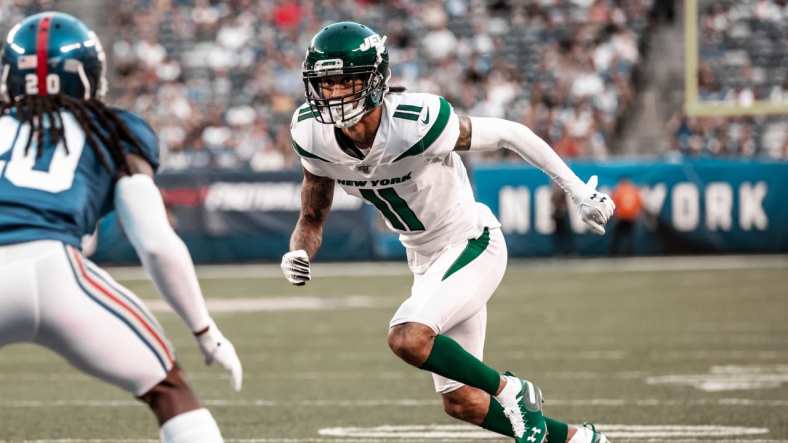
In a recent interview, Las Vegas Raiders general manager Mike Mayock pointed out the team must get better at wide receiver to make the next step. So why should he and Jon Gruden hard pass on one of the league’s best free agents at the position?
We often hear about resisting the urge to reach for overvalued talent during the draft, but teams make the same mistake in free agency. The Las Vegas Raiders will have a projected $57.6 million in cap space for the 2020 offseason. Despite their financial flexibility, they need to spend wisely and should not pursue wide receiver Robby Anderson.
Anderson is one of the most popular free-agent targets within the Raiders fanbase and frequently comes up in discussion. Based on his attributes, a speedy outside vertical threat, he addresses a void in head coach Jon Gruden’s aerial attack.
Last year, quarterback Derek Carr didn’t have a consistent pass-catcher who stretched the field. Tyrell Williams averaged 15.5 yards per catch, but his production faded after scoring in five consecutive contests to open the season.
In December, during an open media conference with local reporters, offensive coordinator Greg Olson confirmed Williams struggled with plantar fasciitis throughout the season:
Other than Williams, the Raiders didn’t have a pass-catcher with at least six receptions average more than 12.7 yards per catch. None of the wideouts eclipsed 651 receiving yards. As a result, we should expect to see new faces at the position next season.
Gruden alluded to bolstering the aerial attack, per Myles Simmons of the Las Vegas Review-Journal.
“Yes, we’re going to have to take a good look at it,” Gruden said. “We’ll see what happens. We still have some young guys who are somewhat unproven. But we’ll be looking to strengthen that group, yes.”
In 2019, Robby Anderson averaged 15 yards per catch, which is consistent with his career 14.8-yard mark. He won a race at the 40 Yards of Gold contest, showing off straight-line speed, before pulling out of the competition for unknown reasons. So, why should the Raiders pass on him in March? It’s strictly because of the 26-year’s financial demands and incoming talent.
New York Jets Unwilling to Pay Robby Anderson $14 Million?
The free-agent market will dictate Anderson’s price tag, though initially, he’s looking for approximately $14 million annually, per ESPN’s Rich Cimini.
“Anderson is expected to seek a contract that will pay him at least $14 million a year, which would put him in the top 15 among wide receivers,” Cimini wrote. “The Jets are justifiably hesitant to go that high.”
Cimini went on to list reasons why the Jets would balk at Anderson’s reported asking price.
“He’s never had a 1,000-yard season, he’s not a red zone threat and he’s a slow starter,” Cimini wrote.

While we can attribute Robby Anderson’s average but unimpressive numbers to mediocre quarterback play, mostly Ryan Fitzpatrick, Josh McCown and Sam Darnold, it’s fair to acknowledge Jamison Crowder was the most productive wideout on the Jets roster in 2019, logging 78 receptions for 833 yards and six touchdowns.
One can argue Anderson wants No. 1 wide receiver money, but he produced at the level of a No. 2 this past year, registering 52 catches for 779 yards and five touchdowns. The Raiders need a lead playmaker at the position—not another secondary option similar to Williams. The Silver and Black should pursue someone who’s going to elevate the group—not merely fit in.
The Jets also need a No. 1 wide receiver. If they’re unwilling to pay Anderson after watching him for four seasons, why should Mayock and Gruden open the checkbook for the fourth-year veteran? If the Raiders sign him, that would seem like a desperate reach for a mid-level wideout.